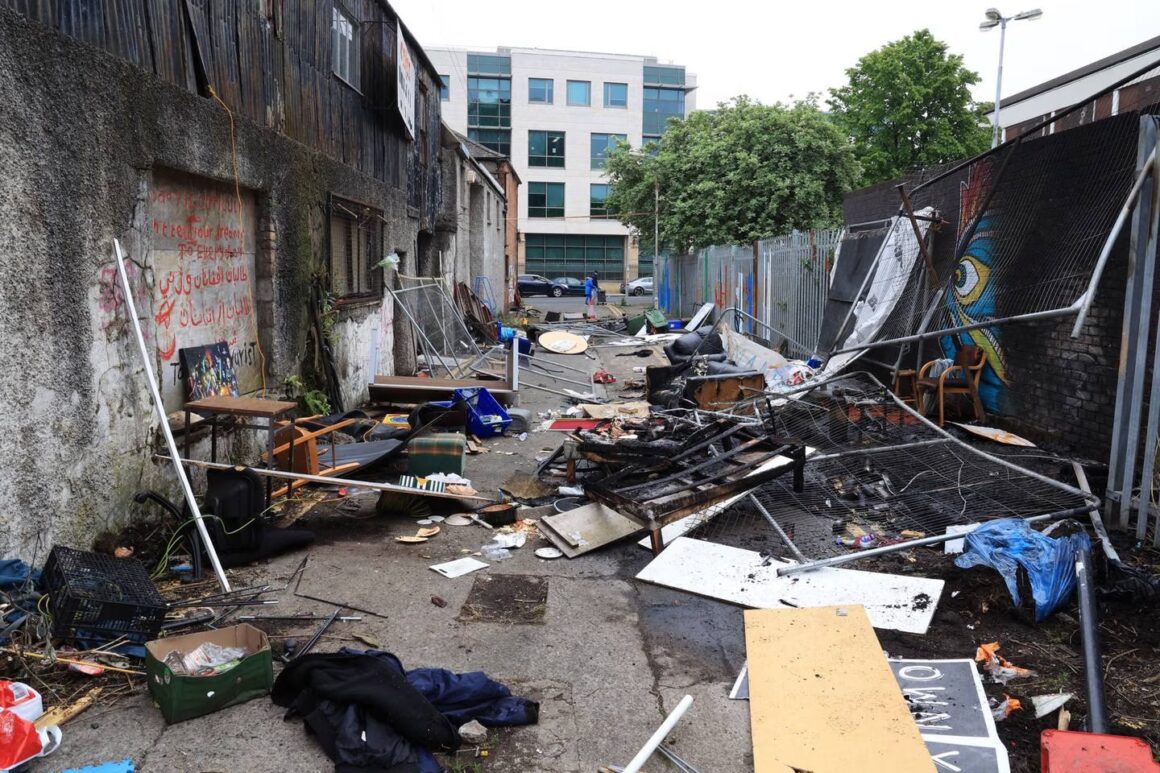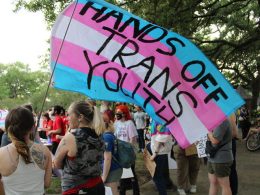By Donal Devlin
The arson attack on refugee camp on Sandwith Street in Dublin City on Friday, 12 May was a disgusting new low in the far-right’s anti-refugee activity in Ireland. Until last weekend the camp had been home to asylum seekers forced to reside on the streets. At the time of writing, there are 500 such homeless refugees in the state. While many of the tents and belongings of those that were formerly in the encampment were burnt, luckily there were no injuries or fatalities.
This attack was preceded by another vile incident the previous day when refugees in the camp were accosted and one physically assaulted. These criminal actions were carried out or orchestrated by known members of far-right groups, with the Gardaí doing precious little to stop their intimidation and violence. The fact that far-right agitators were able to mobilise people from the community in support of their actions, albeit in small numbers, is also deeply concerning, and a warning to anti-racist activists engaging in counter-protests.
Government’s cynical response
The events of last weekend will no doubt have a further chilling effect on migrants and people of colour in Irish society. The growing threat of racism and racist forces is all too real. As Socialist Party TD Mick Barry pointed out in the wake of this attack, “It is only a matter of time before the far right claims its first killing.”
Government Ministers and Taoiseach Leo Varadkar were quick to issue statements of condemnation of the attack on the Sandwith Street camp, but sidestepped an inconvenient question: why were these refugees living there to begin with? The reason goes directly back to a government decision in January, in the wake of a series of far-right protests against the housing of refugees, to continue to provide accommodation only to Ukrainian refugees, with all other refugees left to fend for themselves on arrival in Ireland. This was done with the cynical aim of trying to dissuade refugees from coming here, i.e. if you come to Ireland you face life out on the streets – not so much a choice as a threat.
This was against the backdrop of over 130 people being deported from the state in January, something that the government chose to boast about in the media in a blatant piece of dog whistle politics. This approach only plays into the agenda of the far right, giving succour to their racist talking points. On top of this, the dearth of affordable homes to rent or buy has only added to the sense of alienation felt by working-class people. The housing crisis caused by the government’s housing policy, combined with its racist rhetoric and actions, is creating fertile soil for the far right to gain traction.
An emboldened far right
Unfortunately, the events of last weekend are not without precedent. Since December, the small forces of the far right have become increasingly emboldened and active, particularly in certain deprived working-class communities. This has involved the spreading of racist tropes about migrants, e.g. that migrant men are sexual predators. Intimidatory protests have been organised outside hotels accommodating refugees, and a camp of homeless migrants in Ashtown in Dublin was violently attacked. Far-right groups have also singled out TDs from the socialist left for intimidation, namely Mick Barry at his office and Paul Murphy at his home.
Racism is not the only weapon they have used to further their influence. They have joined in with a more general right-wing backlash against the supposed rise of ‘woke culture’. As part of this, they have gone on the attack against LGBTQ rights, especially trans rights, including targeting libraries in Cork and Fingal for providing LGBTQ-friendly books.
A mass, active anti-racist movement
These events of the last week starkly illustrate the need to build an active movement against the far right in our communities, workplaces, colleges and schools. While challenging the hateful ideas of the far right, such a movement must demand action to address the social problems they aim to exploit for their own interests, such as the worsening housing and cost of living crises. The trade union movement, with its 500,000 members in the state, needs to mobilise its power to demand the building of public homes for all. Working-class people, Irish and non-Irish, should not be in competition for housing due to a crisis created by the profiteering of developers and landlords.
A real multiracial, working-class and youthful movement such as this can deliver decisive blows to these forces and leave them isolated. In February, a protest initiated by Socialist Party public representative Ruth Coppinger, in the wake of the attack in Ashtown, saw hundreds of locals come out in protest within 48 hours. In the following weeks, tens of thousands took to the streets of Dublin to participate in the #IrelandForAll anti-racist and anti-fascist demonstration.
In reality, the forces of the far right have little support in society, and their actions are generally viewed with contempt by the majority of working-class people. This disgust needs to be harnessed, not only to oppose these tiny rotten forces but also the government and capitalist system they represent.
It means fighting for a programme that demands:
- No one should be living on the streets or in homelessness generally. Emergency measures should be implemented, such as the requisition and renovation of empty corporate-owned buildings and the construction of modular homes to house people on a temporary basis as part of a transition to permanent housing.
- For a major programme to build quality, green public homes on land owned by the state. The resources exist to fund these measures, they’re just being hoarded by the super-rich. The richest 1% in Ireland have €232 billion, or 27% of all the wealth. We need emergency taxes on this wealth. On top of the €10 billion budget surplus this year, tax increases on the profits of big business can fund the quality public services we need.
- For LGBTQ-inclusive, consent-based sex education so that misogynistic, transphobic and homophobic ideas can be challenged in all schools.
- Break with this capitalist system – a system that is destroying our planet, fueling wars and forcing millions to leave their homes. This system is fueling racism, division and the poison of the far-right. For a democratic socialist society based on solidarity and equality, in which the key wealth and resources are publicly owned and democratically planned in the interests of all.












